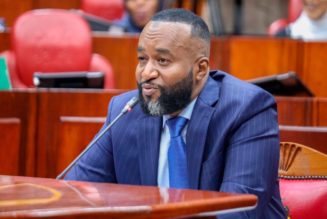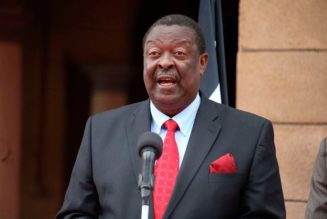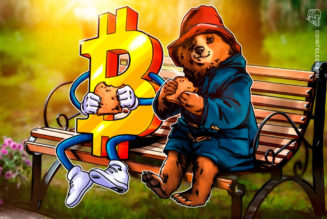Profiles
Nivi Sharma: Leading in the shadow of greatness
Friday January 26 2024

Nivi Sharma is the CEO at Bridges to Prosperity. PHOTO | POOL
Before Nivi Sharma dives into what she does, she first makes this writer eggs with feta cheese and assorted condiments, throws in some spices in a pot, and roasts them before turning water into masala tea. She’s a great cook, but she isn’t as good as her husband, who, she insists, is an excellent cook, a biker, a camper, a man who faces all sunsets. But more of him later.
Now cupping a mug of coffee in her hands, Nivi talks about her tech journey as chief operating officer at BRCK, a tech startup that provided free public Wi-fi, and her innovation of KioKit, an award-winning digital education toolkit. In 2011, she co-founded eLimu, the first company to digitise the Kenyan Primary school curriculum content (later acquired by iHub in 2020).
Then her mother died, and as she scattered half of her ashes over the Ganges River at Rishikesh Bridge in Haridwar, India, she got answers that led her to take on the CEO role at Bridges to Prosperity, a global leader in rural infrastructure. The organisation has built 508 bridges in 21 countries, giving 1.8 million people access.
She serves on Standard Chartered Bank Kenya and The Open Institute boards. When she isn’t cooking or camping with her daughter, husband, and two sausage dogs called Bonanza and Jelly Bean, names she considered naming her daughter had her husband not put the kibosh on that. “Thank God, because he said, ‘No, Nivi, you name the dogs, I will name the child.’”
How did you end up building bridges in rural areas?
A property developer called Ken Frantz from Virginia, US, makes a big killing in a sale and, like a good American, buys himself a new Ford truck. As he sits in the waiting room at the Ford service station, he opens up a copy of a National Geographic magazine. He sees a photo of this broken bridge in Ethiopia, a very historical bridge. It’s called the Sebara Dildy, the Fasil bridge. It is a 17th-century bridge built over the Abbay River. Knowing what he knows about civil engineering and construction, he says, “I can go and build that bridge”.
And so he did and found his calling on that bridge. After that, he went around the world, from South America to Asia, looking for communities that showed a clear need to get from point A to point B and built a few bridges a year.
The turning point for Bridges to Prosperity was established by a young lady – Avery Bang – who came in as a university volunteer. This vision of solving a problem guided her; one in seven people in the world doesn’t always have access, and the amount of infrastructure dollars spent on rural infrastructure is shockingly low, especially given that 80 percent of the poor live in rural areas. Bridges are important in these areas because they help farmers make better decisions about the kind of crops to grow and farm inputs to buy – knowing that a bridge will always be there. This translates to a 75 percent increase in farmer profits and a 30 percent boost in their household income. I love to solve such problems, important problems that touch on humanity.
Was your childhood interesting?
It was a beautiful childhood. I’m grateful to my parents, who raised me to be grateful. They came here as immigrants with few [possessions], but they knew how to cultivate the networks to be entrepreneurs and business people and joy. They loved each other deeply. One of the greatest gifts they gave me, and if I may say, one of the most important things we can teach our children is how to make a happy life for themselves.
When we look around us, at our friendships and work, do we see what’s good about it? That’s the essence of cultivating joy. When dark times come, we should be able to recognise that as the shadow of greatness, right? That has guided me in my professional journey. I can say, yeah, of course, this person isn’t great at filling out spreadsheets and reports, but if I send him to a sales meeting or a meeting with a government official, he will leave with a different heart.

Nivi Sharma is the CEO at Bridges to Prosperity. PHOTO | POOL
What are your earliest memories of your childhood?
Being sent home from school because my parents had not paid my school fees. My mom and dad fought about that because my dad gave away my school fees to help someone who lacked. [Chuckles]
What kind of a man was your dad?
Oh, let me tell you about my mom first. She came from a community of Indians called the Siddhis, known to be astute businesspeople and very good with numbers. They’ve amassed wealth in the Indian diaspora community. On the other hand, my father comes from the Bengalis, a community known for winning Oscars and Pulitzer prizes and writing novels. The Bengalis are very poetic. They compose beautiful songs and literature. Both of my parents refused to live their lives according to the community’s expectations.
Despite their differences, they made a beautiful couple. They loved each other profoundly and balanced each other well. My mom was always thinking about what came next, making plans. She was ambitious. My father always had a joke, a smile, and kindness to share with anyone around him. He was terrible with money. (Chuckles). My dad still walks with a bunch of Sh50 notes that he gives to anyone he thinks the money might bring a smile to their face.
Sometimes, I look at him and think he is just a man looking for external validation. Other times, I see the genuine joy he gets from making other people happy, however big or small that may be. That’s quite an infectious and, sometimes, irritating thing to be around.
Quite the couple, your parents.
Yes. It was my mom’s fourth anniversary on Tuesday. I was raised in the shadow of a great woman. She was brilliant. Being human, she made some horrible mistakes, as we all do in our lives, but she told me to always be present in moments. Like everyone, I’ve been embarrassed by my parents. I have laughed at my parents. I would not always get presents on my birthdays, but she would write me a card filled with blessings, good wishes, love, and aspirations.
She’d list things like how she’s inspired by me and what she sees in me. Being a young woman going into the world, being deeply loved by my mother, my role model, and just being told that I am amazing, that I’ve got greatness in me, that the world is lucky to have me, was so validating. [In reverie]. She would write these cards, run out of space, and write on the back of the cards. She would write poetry for me and my dad. My dad once wrote, “You’re twelve years old now; maybe you can stop being so stupid” on the birthday card she had written for me. [Laughs hard] I still laugh at it to this day. I have kept all those cards. Oh, my dad is such a silly man.
Your mom’s death must have been like a bomb going off in your home.
Devastating. We’re just a nuclear family in Kenya. It’s always been just my brother, myself, and my parents. My mom was the one who would make plans and figure out where we would live and how we would pay bills. She was the breadwinner.
On a recent trip, I realised I’d have to buy flights and book hotels for my father. You know, because he cannot do that.[Chuckles] She was the grown-up. She was the one who would insist on when we would get together whenever there was something important to talk about, what the family needed to do, think about, and pray about. She was a voracious reader and spiritual in a very intellectual sense.
My father’s very ritualistic. He’ll go to the temple, ring the bell, and pour milk daily. My mom would tell us about Jesus and the Sikh gods and say, “Well, why do we light a fire and hold it throughout the house? Why do we light incense sticks? And why do we ring bells?”
How has your dad survived without her?
I think 2020 was a challenging year for a lot of elderly people. For a widower, it was very tough. I think about my mom often, but he thinks about her constantly. He talks about things she would say or approve of or what would irritate her. He kisses her photos, tiny little kisses. [Pensive pause] He loves her deeply. [Pause] For a while, I resented that love as I had boyfriends who would constantly disappoint me. [Chuckles]
What kind of teenager were you?
I was such a terrible teenager. I apologised to my mother all her life for being so bad. I was angry a lot of the time for reasons I felt were good. No one knew why I was rebellious. I would often lie to my parents, sneak out, be in places where I shouldn’t be, try smoking, and have the worst boyfriends.
I put them [parents] through it. When I was getting married, my best friend said, “It’s a good thing you don’t need a hen night, because that’s what your whole life has been”. [Laughs hysterically]. But I really worried my parents. They had a lot of sleepless nights, wondering when I would be home.
What have been some of the notable headwinds of your life?
The death of my mom. Again, like coming back to coins, every coin has a different side to it, right? Her death was devastating, but out of that, I found genuine kindness from strangers and volunteers who came to the morgue and helped me wash her body and dress her up. Did you know that’s a thing people volunteer for? Her death showed me the kindness in humanity.

Nivi Sharma is the CEO at Bridges to Prosperity. PHOTO | POOL
If you were to apologise to one person, who would that be?
[Long pause] It would be some friends I’ve lost along the way. I’m turning 40 soon and through my 30s, I’ve deepened how I think about and navigate friendships. I don’t have many friends, maybe one or two friends I could call in the middle of the night to bury a body.
I’ve walked away from a lot of friendships without having important conversations. Maybe I’ve hurt those people. I also think of past romantic relationships as well. I’ve been flippant in ending relationships that didn’t align with mine. I don’t know if that’s a function of being an Aquarius, being able to move on. But I think I’ve hurt a lot of people. I would apologise to these people.
Do you feel a shift as you approach 40?
I think 40 is a powerful time in a woman’s life. There’s so much written about menopause, which I’m not at yet there, but as women, one of the interesting side effects of menopause that is not spoken about enough is your oestrogen makes you nice to people, and so as women hit menopause, their nonsense detector gets really honed in. When you see more women leaving their husbands and filing for divorce, it really is a function of not having enough oestrogen. [Chuckles] So, I think the shift I’m seeing is being more selective with who I allow into my space and more gracious and understanding.
Your parents set a benchmark for relationships. Were you looking for your father in the man to marry?
Two young fish swimming through the water meet an older fish who says, ‘Good morning, how’s the water?’ The two fish swim on, and one turns and asks the other, ‘What water?’ That’s a good way of explaining how your parents’ relationship shapes what you think relationships should be, whether abusive or loving.
I didn’t see many other couples growing up because we didn’t have a huge social circle or a big family. I always said, ‘I’m going to marry a man who’s got a big career, and the financial burden should not fall on me to be the sole breadwinner.’
Looking at my dad’s flaws – forgetfulness, etc – I was going to marry an organised man, but on the other side of the coin, a man beautiful in personality, a generous human man like my dad. But then it all changed, and at some point, I was sure the non-negotiables were not about money or ambition.
I never heard my father raise his voice, let alone his hand, or swear at my mother. And I can’t imagine my husband or a partner doing that. And maybe that’s why I’ve had so many failed relationships: You raised a voice, and I was a foot out. My husband is a beautiful, kind, and loving man who has never changed his true nature, so yes, I married my father. [Laughs]
How did you two meet?
During the Constitution referendum. I had organised an election observation, and he was one of the volunteers. A few years later, I was having a Kenya Jubilee housewarming party, and I invited him. The dress code theme was gold, so he came carrying a Tullamore Dew whisky. He hung out in the kitchen (he loves to cook) where on the blackboard wall, which featured a chapati-maker at the top, he drew graffiti around it and wrote the words ‘Jackpot!” [Laughs]
After a week or two of dating, we both knew we had found ‘the one’. He took me on his motorbike, a Honda, to a tea plantation in Limuru, where he proposed. It’s the same motorbike we rode on our wedding day. Even eight years after our wedding, I still feel he is ‘the one’. We still acknowledge to each other how lucky we are to have this kind of love. He’s a very kind and loving soul, a brilliant cook, and a beautiful father to our daughter. I’m lucky.









